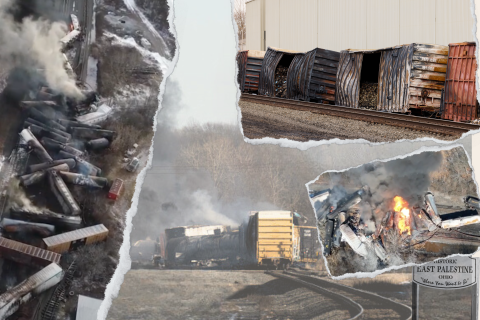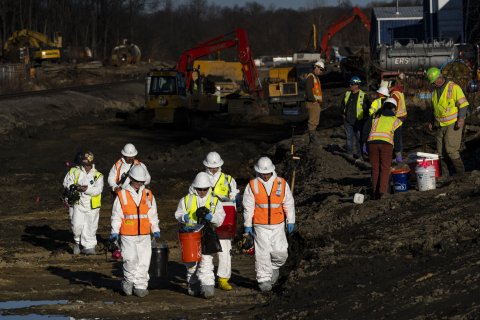It's a year to the day since a train carrying various toxic chemicals derailed in East Palestine, Ohio—yet, as a federally managed recovery operation continues, locals still sometimes smell something "rotten" in the air.
"I can't tell anyone where I live without them having a look of sorrow," Kasie Locke, a resident, told Newsweek. "Even though day to day we're trying our best to go about our normal lives in the best way we all can, I will still always have an ill feeling when I think about how the rest of my family's life is going to go."
Others have even left the area over fears about their health—while two nearby waterways continue to contain pollutants.
Residents of the small border town had been getting home from work on this day in 2023 and having their dinner when their evenings were disrupted by the sight of smoke rising from the nearby railroad.

The Norfolk Southern train had derailed about a quarter of a mile from the Pennsylvania state line, and a fire was burning. Little did the locals know then that the incident would have an ongoing impact on their lives.
Of 150 cars the train was hauling, a third were affected by the derailment in some way. Twenty of those contained hazardous materials, some of which spilled into the nearby ground and waterways, while the pressure rose in others due to the heat of the fire.
Fearing a sudden explosion, emergency responders breached five cars containing vinyl chloride and diverted the chemical into a trench to be burnt off. East Palestine was evacuated, as officials warned that the controlled burn would send phosgene—used to attack trenches during World War I—and hydrogen chloride—which can cause serious irritation and tissue corrosion—into the surrounding atmosphere.
When they were allowed to return home, locals complained of symptoms associated with exposure to toxic chemicals, while those with private wells were told to drink bottled water while the water supply was tested.
Trying to Live a Normal Life
Locke and husband Nate's son was a newborn when the derailment happened. The young family had moved to East Palestine a year to the day before the incident, but found themselves staying with her mother in North Lima instead of their home.
The couple returned after six months as "it seemed the only choice we really had," Locke said, having only recently put all their money into buying their house. The headaches, burning eyes and itchy throats they experienced in the immediate aftermath of the derailment have subsided, but she says there is a "suspicious" smell when it rains.
"l can't put my finger on it, but it doesn't smell just like a normal rainy day," Locke explained. "Chemically sometimes, or rotten sometimes, in different parts of town." But, she added, "it's hard to tell if we've just gotten used to being here or not."
Before moving back in, the couple replaced anything in their home that was porous or could not be cleaned thoroughly. They did accept a total of $3,600 from Norfolk Southern, but estimate to have spent a further $3,500-$4,000 of their own money replacing furniture and fittings, as the rail operator wanted proof of purchase for reimbursements and—"because we were on a budget to replace things and move back in"—they bought items second hand online, and from family and friends.
Locke said they refrain from using the tap water—it makes her skin feel "drier," which she suspects is due to the agents being used to treat the local water supply.
A spokesperson for the Environmental Protection Agency (EPA) indicated tap water has not been contaminated, but that monitoring is ongoing. The spokesperson said that, since the evacuation order was lifted, "no monitoring readings or analytical results for the contaminants of concern... have been found above action levels established for the site."
The spokesperson added that it has been supporting "rapid research targeted to the health concerns raised by some community members."
"We're trying our best to continue on with our normal lives, and staying hopeful and positive. That doesn't mean we're not being cautious though," Locke added. "If we'll feel long-term effects, that will be detrimental to our lives. That's a horrible feeling when you've got a one-year-old who hasn't even started their life. There will always be what ifs, doubts and questions that we'll never get answers to."
While some have tried to make the best of their lives in East Palestine, others have opted to leave the close-knit town. Maura Todd, who left for Lexington, Kentucky, after her young son began profusely vomiting and she suffered headaches, moved away permanently in June.
"We transferred our deed to friends who wanted to stay," she told Newsweek. "We lost everything."
Todd said her family has been staying with friends, but would likely remain indefinitely after her long-running case of cancer returned, requiring a course of chemotherapy.
'Biden Is Very Late in Showing Up'
Earlier this week, the White House announced that President Joe Biden would visit East Palestine sometime this month "to meet with residents impacted by the Norfolk Southern train derailment, discuss federal support to the community, and hold Norfolk Southern accountable."
For some, the trip is long overdue. Biden has faced repeated questions about when he would go to the derailment site, and previously drew ire over his decision to visit Kyiv ahead of the first anniversary of the start of the Russian invasion of Ukraine instead of the domestic crash site in the immediate aftermath. Trent Conaway, the mayor of East Palestine, described the trip to Ukraine as a "slap in the face."
Meanwhile, former President Donald Trump flew there to deliver supplies and bottled water to residents two weeks after the evacuation order was lifted. Transportation Secretary Pete Buttigieg—who faced criticism from both sides of the aisle for a perceived lack of response to the toxic spill—visited a day later.

In a call with rail labor leaders on Thursday, Buttigieg said rail workers and residents of East Palestine "deserve more than social media outrage" and that, among the actions it had taken in the past year, the Department of Transportation was "holding railroads accountable" with 7,500 inspections along high-hazard train routes.
He also criticized Republicans in Congress who had expressed outrage at the derailment but had since voted against legislation to improve rail safety.
An ongoing National Transportation Safety Board (NTSB) investigation suggested that the derailment had been caused by an overheated wheel bearing on one of the cars failing. The controlled burn was initiated as pressure relief valves on the cars did not function, and the NTSB said that the melting of their aluminum covers may have prevented them from working.
Locke said of Biden's visit that "it doesn't make a difference to me if he came now or not, being that it's been a year."
"We had active members of the community and active members of different communities all over the world who stepped up right away when East Palestine was in the thick of it and really genuinely needed help," she said. "I'm still just feeling very upset and angry that no one really took accountability until it was nationwide news, and now that [it]'s a year later they're just kind of letting things blow over."
"I feel like Joe Biden is very late in showing up for East Palestine," Todd said. "A big part of the problem is that nobody is being a leader in this situation, and it's a little late right now, but someone needs to help people who have been victimized rebuild their lives. Otherwise, why do we have a government if not for the people?"
When approached for comment, a White House spokesperson directed Newsweek to a statement by press secretary Karine Jean-Pierre on Thursday in which she said Biden had been invited by Conaway to visit "very recently," which was why "we felt that the time was right."
"The president had always said that he would go when it is most helpful to the community," she added. "Whether it's a derailment or a natural disaster, the president says this all the time: He is there for that community for as long as it takes."

The EPA has repeatedly stressed that federal personnel were on the ground directing the response to the derailment "within hours" of it occurring, and have continued to coordinate the clean-up operation since.
"More than 500 EPA staff have been involved in the response since the derailment occurred, and EPA personnel remain on the ground today to ensure Norfolk Southern is held accountable for the damage they have inflicted on the community," an agency spokesperson told Newsweek.
"EPA's number-one priority remains ensuring the health and safety of East Palestine residents and surrounding communities in the aftermath of the Norfolk Southern train derailment. Work will continue as long as necessary to provide the reassurances that the residents of East Palestine and the surrounding communities deserve."
Newsweek also approached Norfolk Southern for comment on Friday.
Norfolk Southern said in late January that it had made "significant progress" in East Palestine and was "now focused on our long-term initiatives to address health concerns, protect home values, and safeguard area drinking water."
In a progress report, the operator's CEO Alan Shaw said it had committed more than $103 million to the recovery effort, including a pledge of $4.3 million to upgrade the local drinking water infrastructure. "We will keep working for as long as it takes for the East Palestine area to return to the kind of thriving community its people are truly proud to call home," he added.
Recovery Continues, but Skepticism Remains
In the 12 months since the crash, EPA personnel and Norfolk Southern contractors have worked to remove nearly 177,000 tons of contaminated soil and treat stretches of the Sulphur Run and Leslie Run creeks that were visibly polluted by the derailment. Over 44 million gallons of wastewater has also been shipped away.
In an operational update on January 26, the EPA said Norfolk Southern was continuing to replace stone and gravel at excavation sites, while as of January 10, Sulphur Run and Leslie Run were observed to have 66 percent and 59 percent sheen—a layer of chemicals on the surface—respectively.
Air and water monitoring continues around the town. A study across 50 buildings including 45 homes, conducted in September and released last month, found that, on average, indoor air in the town had a moderate concentration of volatile organic compounds and fine particulate matter.

Marc Glass, principal environmental consultant at Downstream Strategies, who has advised state and federal governments on contamination, told Newsweek that a colleague who has been working on the clean-up of the creeks had said that "some of the ecological benchmarks were actually really good in what they'd seen downstream" with aquatic life returning, even though pollutants remained in the immediately affected stretch.
"Because they've focused so much on source removal and recovery, that that's really going to remove a lot of the long-term effects," he said. "That's the key, right: it's getting rid of the source."
However, he expressed concern about the breakdown of vinyl chloride into smaller contaminants that could get into aquifers deep underground and eventually make their way into accessible water nearer the surface.
An EPA spokesperson said "ongoing science-based reviews show that residents of East Palestine are not in danger from impacted surface water, soil, or air from the derailment."
The spokesperson added: "If any outside expert has credible science to show that people are in danger, we stand ready to examine that science and engage constructively."
Despite the recovery effort, skepticism remains among residents. A November survey of 256 locals found nearly half had cut their use of municipal water, while 30 percent expressed unease towards using their household water. Some 75 percent said they did not trust the results of air sampling.
Update 2/3/24, 6:55 a.m. ET: This article was updated to include comment from an EPA spokesperson.









